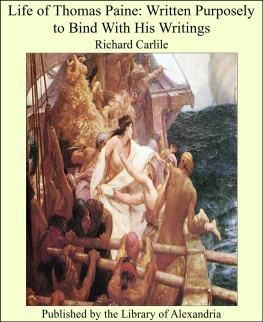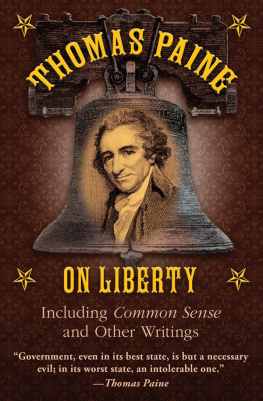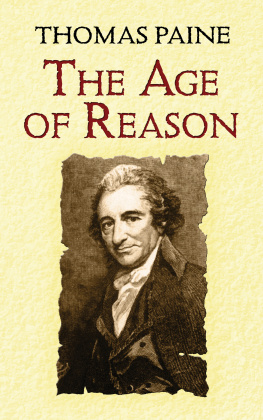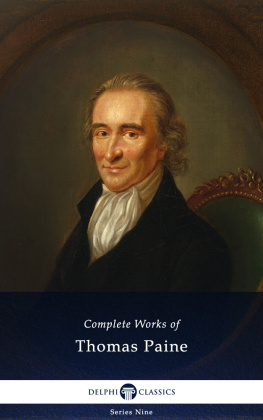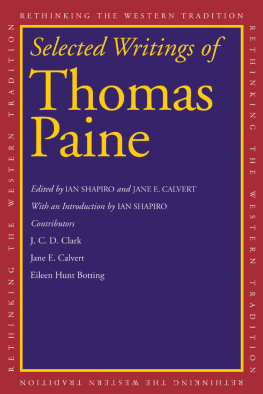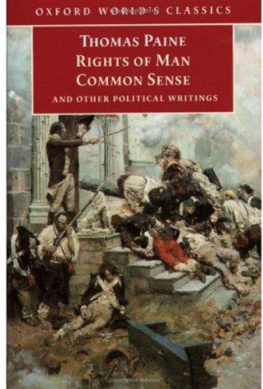By Richard Carlile
SECOND EDITION.
1821.
LIFE OF THOMAS PAINE
The present Memoir is not written as a thing altogether necessary, or what was much wanted, but because it is usual and fitting in all collections of the writings of the same Author to accompany them with a brief account of his life; so that the reader might at the same time be furnished with a key to the Author's mind, principles, and works, as the best general preface. On such an occasion it does not become the Compiler to seek after the adulation of friends, or the slander of enemies; it is equally unnecessary to please or perplex the reader with either; for when an author has passed the bar of nature, it behoves us not to listen to any tales about what he was, or what he did, but to form our judgments of the utility or non-utility of his life, by the writings he has left behind him. Our business is with the spirit or immortal part of the man. If his writings be calculated to render him immortal, we have nothing to do with the body that is earthly and corruptible, and which passes away into the common mass of regenerating matter. Whilst the man is living, we are justified in prying into his actions to see whether his example corresponds with his precept, but when dead, his writings must stand or fall by the test of reason and its influence on public opinion. The excess of admiration and vituperation has gone forth against the name and memory of the Author of "Rights of Man," and "Age of Reason," but it shall be the endeavour of the present Compiler to steer clear of both, and to draw from the reader an acknowledgement that here the Life and Character of Paine is fairly stated, and that here the enquirer after truth may find that which he most desiresan unvarnished statement.
Thomas Paine was born at Thetford, in the county of Norfolk, in England, on the 29th of January, 1737. He received such education as the town could afford him, until he was thirteen years of age, when his father, who was a staymaker, took him upon the shop-board. Before his twentieth year, he set out for London to work as a journeyman, and from London to the coast of Kent. Here he became inflamed with the desire of a trip to sea, and he accordingly served in two privateers, but was prevailed upon by the affectionate remonstrances of his father, who had been bred a Quaker, to relinquish the sea-faring life. He then set up as a master stay maker at Sandwich, in the county of Kent, when he was about twenty-three years of age. It appears that he had a thorough distaste for this trade, and having married the daughter of an exciseman, he soon began to turn his attention to that office. Having qualified himself he soon got appointed, but from some unknown cause his commission scarcely exceeded a year. He then filled the office of an usher at two different schools in the suburbs of London, and by his assiduous application to study, and by his regular attendance at certain astronomical and mathematical lectures in London, he became a proficient in those sciences, and from this moment his mind, which was correct and sound, began to expand, and here that lustre began to sparkle, which subsequently burst into a blaze, and gave light both to America and Europe.
He again obtained an appointment in the Excise, and was stationed at Lewes, in Sussex, and in this town the first known production of his pen was printed and published. He had displayed considerable ability in two or three poetical compositions, and his fame beginning to spread in this neighbourhood, he was selected by the whole body of excisemen to draw up a case in support of a petition they were about to present to Parliament for an increase of salary. This task he performed in a most able and satisfactory manner, and although this incident drew forth his first essay at prose composition, it would have done honour to the first literary character in the country; and it did not fail to obtain for Mr. Paine universal approbation. The "Case of the Officers of Excise" is so temperately stated, the propriety of increasing their salaries, which were then but small, urged with such powerful reasons and striking convictions, that although we might abhor such an inquisitorial system of excise as has long disgraced this country, we cannot fail to admire the arguments and abilities of Mr. Paine, who was then an exciseman, in an endeavour to increase their salaries. He was evidently the child of nature from the beginning, and the success of his writings was mainly attributable to his never losing sight of this infallible guide. In his recommendation to Government to increase the salaries of excisemen, he argues from natural feelings, and shews the absolute necessity of placing a man beyond the reach of want, if honesty be expected in a place of trust, and that the strongest inducement to honesty is to raise the spirit of a man, by enabling and encouraging him to make a respectable appearance.
This "Case of the Officers of Excise" procured Mr. Paine an introduction to Oliver Goldsmith, with whom he continued on terms of intimacy during his stay in England. His English poetical productions consisted of "The Death of Wolfe," a song; and the humourous narrative, about "The Three Justices and Farmer Short's Dog." At least, these two pieces are all that we now have in print. I have concisely stated Mr. Paine's advance to manhood and fame considering the act but infantile in being elaborate upon the infancy and youth of a public character who displays nothing extraordinary until he reaches manhood. My object here is not to make a volume, but to compress all that is desirable to be known of the Author, in as small a compass as possible. Mr. Paine was twice married, but obtained no children: his first wife he enjoyed but a short time, and his second he never enjoyed at all, as they never cohabited, and before Mr. Paine left England they separated by mutual consent, and by articles of agreement. Mr. Paine often said, that he found sufficient cause for this curious incident, but he never divulged the particulars to any person, and, when pressed to the point, he would say that it was nobody's business but his own.
In the autumn of 1774, being then out of the Excise, he was introduced to the celebrated Dr. Franklin, then on an embassy to England respecting the dispute with the Colonies, and the Doctor was so much pleased with Mr. Paine, that he pointed his attention to America as the best mart for his talents and principles, and gave him letters of recommendation to several friends. Mr. Paine took his voyage immediately, and reached Philadelphia just before Christmas. In January he had become acquainted with a Mr. Aitkin, a bookseller, who it appears started a magazine for the purpose of availing himself of Mr. Paine's talents. It was called the Pennsylvania Magazine, and, from our Author's abilities, soon obtained a currency that exceeded any other work of the kind in America. Many of Mr. Paine's productions in the papers and magazines of America have never reached this country so as to be republished, but such as we have are extremely beautiful, and compel us to admit, that his literary productions are as admirable for style, as his political and theological are for principle.
From his connection with the leading characters at Philadelphia, Mr. Paine immediately took a part in the politics of the Colonies, and being a staunch friend to the general freedom and happiness of the human race, he was the first to advise the Americans to assert their independence. This he did in his famous pamphlet, intitled "Common Sense," which for its consequences and rapid effect was the most important production that ever issued from the press. This pamphlet appeared at the commencement of the year 1776, and it electrified the minds of the oppressed Americans. They had not ventured to harbour the idea of independence, and they dreaded war so much as to be anxious for reconciliation with Britain. One incident which gave a stimulus to the pamphlet "Common Sense" was, that it happened to appear on the very day that the King of England's speech reached the United States, in which the Americans were denounced as rebels and traitors, and in which speech it was asserted to be the right of the Legislature of England to bind the Colonies in all cases whatsoever! Such menace and assertion as this could not fail to kindle the ire of the Americans, and "Common Sense" came forward to touch their feelings with the spirit of independence in the very nick of time.

